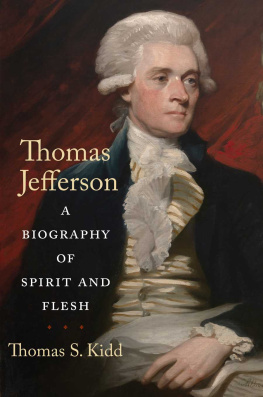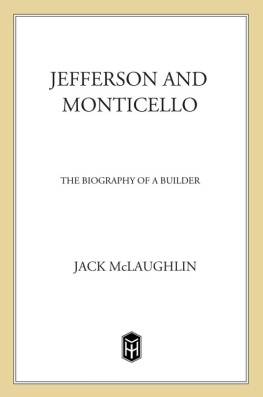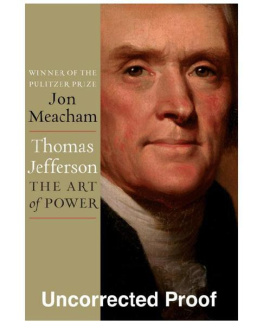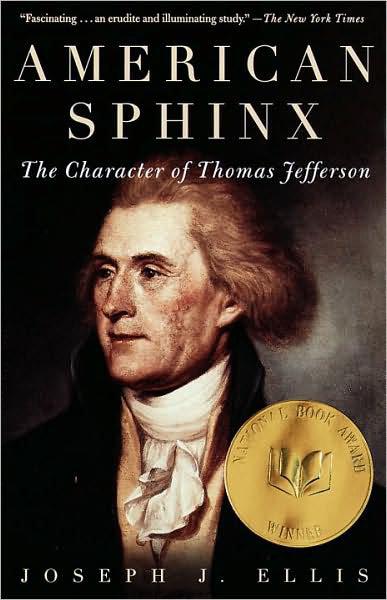
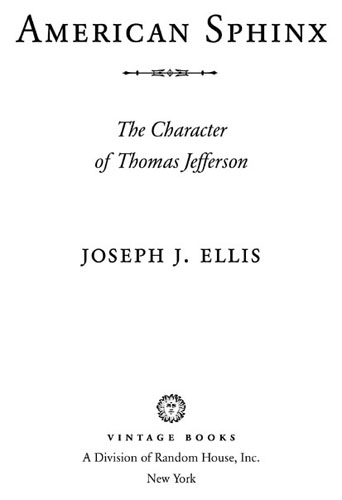
For Edmund S. Morgan
CONTENTS
PREFACE AND ACKNOWLEDGMENTS
A NY ASPIRING BIOGRAPHER of Jefferson, recognizing the ink already spilled and the libraries already filled, might do well to recall the young Virginians famous words of 1776. Which is to say that no one should undertake yet another book on Thomas Jefferson for light and transient causes. In fact prudence dictates and a decent respect of the opinions of mankind requires that the publication of all new books about that man from Monticello be accompanied by a formal declaration of the causes that have impelled the author to undertake the effort.
My own defense would begin over thirty years ago, when I entered graduate school at Yale to study early American history. It is impossible to avoid Jefferson while attempting to master the story of the American Revolution, since his career crisscrosses the major events of the era. And his ideas, or at least the ideas for which he became the most eloquent spokesman, define the central themes of the story of the emerging American republic. Moreover, I was a native Virginian who, like Jefferson, had graduated from the College of William and Mary. I even had reddish blond hair like Jefferson and had learned how to disguise my insecurities behind a mask of enigmatic silence. It was therefore natural for me, once ensconced in the former cradle of New England Puritanism and Federalism, to identify with Jeffersons edgy doubts about the arrogant austerities and quasi-Arctic climate of New England.
My eventual mentor in graduate school, Edmund S. Morgan, even had a huge Jefferson portrait on his office wall, the luminous Rembrandt Peale likeness of 1800, which looked down on our seminar sessions with otherworldly authority that I found oddly reassuring. Jefferson and I were kindred spirits, I told myself, allies in this alien world where a southern accent seemed inversely correlated with ones seriousness of purpose. This youthful infatuation for Jefferson eventually went the way of my southern accent, never completely gone altogether but relegated to the blurry margins, where it lost its distinctive character. Like any young love, however, it became a permanent part of my emotional inventory.
Not that I actually knew very much about Jeffersons life or thought. My affinity for Jefferson was more personal than scholarly. Only once, when I was scouting about for a dissertation topic, did I consider working on Jefferson. My recollection is that C. Vann Woodward, a fellow southerner also recently arrived in New Haventhough as a mature and not just budding historianalerted me to the dangers. One should not attempt biography until a bit further down the trail of life, he suggested. As for Jefferson, he was such a sprawling and famously elusive subject that any young historian who sallied forth after him was like the agile youth sent forward against impossible odds in a story about the tragic casualties of war. This excellent advice had the immediate sound of truth. I did not give Jefferson any serious scholarly consideration for another twenty-five years.
As a college teacher I assigned books about Jefferson in my courses, and I developed formal lectures on the Declaration of Independence and Jeffersons paradoxical stance on slavery. But it was not until I began research for a book on John Adams that I probed beneath the surface of the Jefferson correspondence. It was an odd way for a Virginian to come home again, arriving at Monticello by way of Quincy, but that is how it happened.
Adams had a truly special relationship with Jefferson that developed out of their common cause against English imperial rule and their different roots in the regional cultures of New England and Virginia. As a result, Adams admired, even loved Jefferson; they sustained a fifty-year friendship that culminated in an exchange of letters in their twilight years that most historians regard as the intellectual capstone to the achievements of the revolutionary generation. But Adams also disagreed profoundly with Jeffersons version of the American Revolution. Indeed he thought that Jeffersons entire political vision rested on a seductive set of attractive illusions. The more I read, the more I concluded that Adams was right. For the first time I began to see Jefferson critically and ironically.
My clinching commitment to a book-length study of Jefferson came in the process of writing an essay for the inaugural issue of Civilization about Jeffersons somewhat problematic place in contemporary American culture. If my work on Adams had given me a new perspective, my essay for Civilization gave me a fresh appreciation of Jeffersons resonance as an American icon. One could work for several years on Adams and enjoy splendid isolation. But working on Jefferson was like entering a crowded room in which there were always several ongoing conversations, and the constant buzz suggested that more was at stake than the resolution of merely historical questions. Jefferson was electromagnetic. He symbolized the most cherished and most contested values in modern American culture. He was one of those dead white males who still mattered.
These evolving thoughts became not just the reasons for writing a book about Jefferson but also the decisive influences on the shape of the book itself. The vast literature on Jefferson has a decidedly hyperbolic character, as if one had to declare ones allegiance at the start for or against the godlike version of Jefferson depicted in Jean-Antoine Houdons marble bust or at least Rembrandt Peales saintly portrait. This overdramatized atmosphere actually reproduces the polarized and highly politicized climate of opinion in Jeffersons own lifetime, when you were either with him or against him, loved him or hated him. True enough, most biographers take the sides of their subjects. But in Jeffersons case the sides are more sharply drawn and the choices less negotiable. It seems impossible to steer an honorable course between idolatry and evisceration.
That is precisely the course I have tried to pursue in the pages below, inspired by the example of John Adams to believe that affection and criticism toward Jefferson are not mutually exclusive postures, rooted in the assumption that no authentically human creature who ever walked the earth could bear the mythological burden imposed on Jefferson, convinced in my own mind that youthful infatuations must go the way of youth, that all mature appraisals of mythical figures are destined to leave their most ardent admirers somewhat disappointed. The best and the worst of American history are inextricably tangled together in Jefferson, and anyone who confines his search to one side of the moral equation is destined to miss a significant portion of the story.
My approach is selectiveone early reader even called it cinematicbut maintains a traditional commitment to chronology. Another full-scale, multivolume narrative of Jeffersons life and times is clearly unnecessary. My goal is to catch Jefferson at propitious moments in his life, to zoom in on his thoughts and actions during those extended moments, to focus on the values and convictions that reveal themselves in these specific historical contexts, all the while providing the reader with sufficient background on what has transpired between sightings to follow the outline of Jeffersons life from birth to death. This approach requires that choices be made all up and down the line, and I can only concur with the inevitable critics who conclude that the crucial years as secretary of state or the exasperating experience of his second term as president cry out for fuller treatment. My only defense is to cite the extensive scholarship that already exists, to reaffirm my belief that Jeffersons story needs to fit between two covers and to admit my self-protective desire to avoid the fate of so many predecessors: a free fall into the Jeffersonian abyss.
Next page

